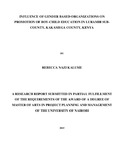| dc.description.abstract | Gender Based Organizations, over the years, have provided strategies to address problems that are
related to gender issues in the society. However, the meaning of the word ‘gender’ has been
misinterpreted as only female due to the constant campaigns that give attention to the needs of the girlchild,
hence leaving the boy-child’s needs unattended. This research therefore studied the influence of
gender based organizations in promotion of boy-child education in Lurambi Sub-county of Kakamega
County. The study focused on the following objectives; to determine the extent to which funding
mechanisms of gender based organizations influence promotion of boy-child education in Kenya; to
establish the extent to which the organizational policy of gender based organizations influence
promotion of boy-child education in Kenya; to assess the extent to which community cultural aspects
influence gender based organizations on promotion of boy-child education in Kenya and to examine the
extent to which the operating environment of gender based organizations influence promotion of boychild
education in Kenya. The target population for the study was 320 and the sample size 175. The
study employed the descriptive type of research design and the data was collected using questionnaires
and interview schedules. It was then analyzed using frequency percentages and cross tabulation by
computer using the Statistical Package for Social Sciences (SPSS). 131 respondents participated in the
study and their data was presented using tables. The study revealed that GBOs are key parties in
ensuring that the promotion of boy-child education is felt in the community despite the financial and
other challenges they face. Some of the findings drawn from the study include 87.8% of the GBOs
stating that they support boy-child education, 52.7% alleging that their gender policy guides them in
implementing their performance framework, 42.7% indicating that most families do not sponsor
directly, their male children to school up to tertiary level of education due to high poverty levels and
29.8% providing information that most of their beneficiaries accessed their services through the
application forms they distributed in the community. The study recommends that the GOK should
enhance its involvement with GBOs to ensure that boy-child education is fully incorporated in its areas
of planning and development and concludes that the boy-child needs should be equally addressed as the
girl-child’s. | en_US |

